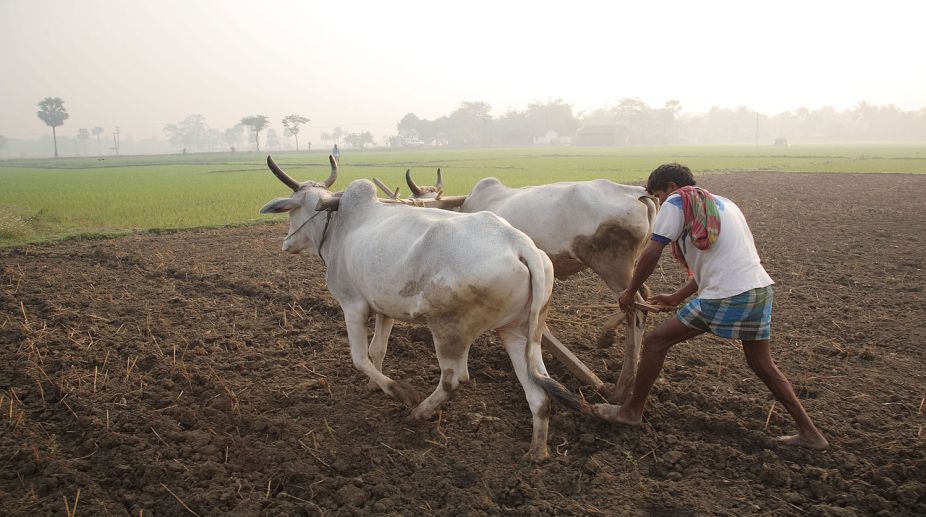PM Modi to release 19th instalment of PM-KISAN scheme at Bhagalpur, Bihar on Feb 24
Prime Minister Narendra Modi will release the 19th instalment of the PM-KISAN scheme at Bhagalpur, Bihar on Monday.

(Photo: Getty Images)
Many-sided distress of farmers has led to intense movements of farmers in recent months. In the course of these movements important issues were raised and several demands of farmers were highlighted. Some issues got a lot of attention, while other equally or perhaps more important problems did not get the necessary attention.
The issue of ensuring remunerative and higher prices to farmers was well highlighted, as also that of providing relief from debt. In fact debt waivers of various kinds have already been announced in Uttar Pradesh, Maharashtra and Punjab.
Advertisement
Another important issue which got attention was why and how benefits of muchpublicised crop insurance schemes had not reached farmers as per their expectations. On the other hand several important issues have not received attention even now. Firstly there is the important need to reduce costs of farming. Secondly there is the need to emphasise that solutions should encourage eco-friendly practices.
Advertisement
Only then would these solutions be sustainable. Otherwise we will merely be going from one crisis to another. During the last five decades or so the government has favoured policies and technologies that have increased farming costs relentlessly – whether it is the cost of fertilizer or pesticide, or seeds of big companies or even various kinds of farm machinery.
The government implemented policies which trapped farmers in these technologies and later the price of some inputs went up sharply.
The next phase is that of extension in some way or the other of intellectual property rights to seeds and farming. This is also the phase of aggressive promotion of GM crops which get concentrated in the hands of fewer and bigger multinational companies bent on dominating the world food and agriculture scene. India is predominantly a land of small farmers who have very low capacity to absorb losses.
They do not have the resource base for this and even relatively small losses lead to borrowings at high interest rates. There are uncertainties associated with farming that have only increased with climate change, erratic weather patterns and a declining water table.
Hence a relentless rise in costs over the years has been one of the most important factors behind increasing debts and distress of farmers. To find a way out of this distress, methods of reducing costs on a sustainable basis have to be found. Dozens of interesting experiments and initiatives all over the country have established that it is possible to reduce costs on a sustainable basis.
These possibilities will increase if the government invests in a bigger way in water and moisture conservation, in improving pastures and the green cover of indigenous trees of diverse species, protection of traditional seeds and smallscale, low-cost irrigation projects.
All these should be taken up with the involvement of local villagers. For sustainable and broad-based well-being of farming and farmers, it is important to maintain the fertility of soil, the water table and also be protective towards the various pollinators and friendly birds, insects and microorganisms.
But the policies and technologies pursued in India have destroyed the natural fertility of soil, depleted and lowered the water table while perpetuating genocide against bees and other pollinators, various friendly insects, earthworms and micro organisms.
It is a measure of distorted thinking that areas where this has happened on the largest scale are termed in official jargon as the most developed areas. Now with the advent of GM crops and related technologies, the ground is being prepared for the next stage of irreversible ecological ruin.
This officially subsidized ecological destruction has been responsible for the many-sided distress of farmers. Several experiments and initiatives reveal that it is still possible to come out of the trap of this ecologically destructive farming and adopt sustainable, eco-friendly farming practices.
The twin challenges of reducing costs and protecting the environment are mutually supportive. The same methods, technologies and policies can be useful in protecting the environment and reducing costs. In some places organic and eco-friendly farming has been made needlessly expensive by adding costly certification procedures. This is not for us. We need those ecofriendly methods which are so low cost as to be close to zero budget. Very low cost methods and ecologically protective methods become possible within the overall perspective of self-reliant communities, a concept which was favoured by Mahatma Gandhi.
So the key issues are reducing costs, eco-friendly farming and an overall perspective of increasing self-reliance. These extremely important issues need to receive much more attention in the farmers’ movements than has been the case so far.
(The writer is a freelance journalist who has been involved with several social movements and initiatives.
Advertisement